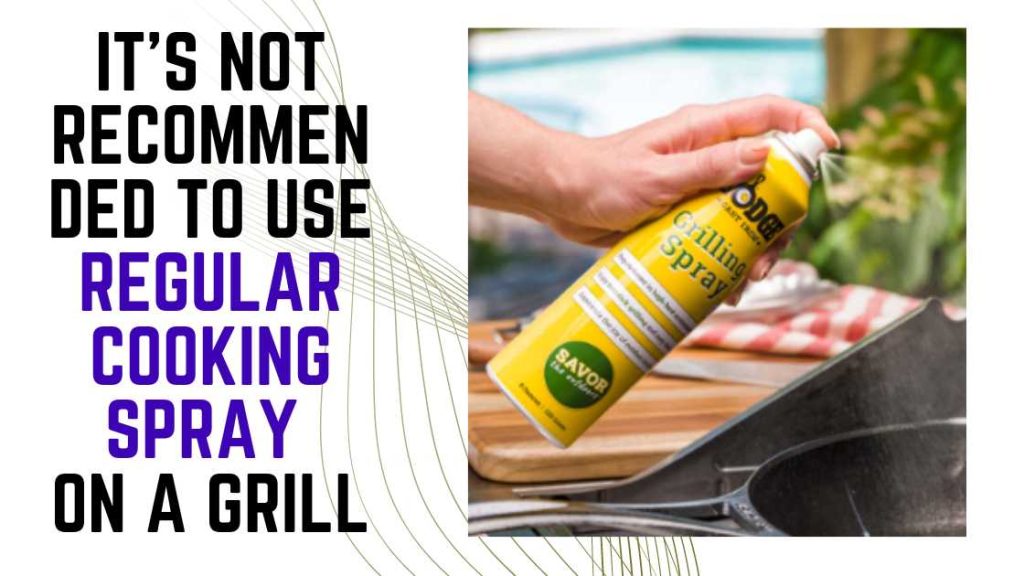No, it’s not recommended to use regular cooking spray on a grill. It can create excessive smoke and potentially dangerous flare-ups.
For grilling, it’s better to use oils specifically designed for high-heat cooking, like canola oil or grapeseed oil. These oils have higher smoke points, making them more suitable for the intense heat of a grill. Additionally, applying oil directly to the grill grates with a brush or spray designed for grilling can help prevent sticking without the risks associated with regular cooking sprays.
| Aspect | Regular Cooking Spray | High-Heat Grill Spray/Oil |
|---|---|---|
| Smoke Point | Low (Varies by Brand) | High (Canola: ~450°F, Grapeseed: ~420°F) |
| Risk of Flare-Ups | High | Low |
| Flavor Impact | Can impart an off taste | Minimal to none |
| Safety | Potentially unsafe | Generally safe |
| Usage | Not recommended for grilling | Recommended for grilling |

Benefits of Using a Grilling Spray
Using a grilling spray can offer several benefits when it comes to grilling, enhancing your cooking experience and the quality of your food. Here’s a breakdown of the key advantages:
1. Reduces Sticking
- Benefit: Prevents food from sticking to the grill grates, making it easier to flip and remove items without them falling apart or tearing.
- How It Helps: Creates a non-stick layer on the grill surface, which is particularly useful for delicate items like fish or vegetables.
2. Enhances Flavor
- Benefit: Some grilling sprays are infused with flavors such as herbs or spices, which can add an extra layer of taste to your food.
- How It Helps: Adds subtle flavor to grilled items, enhancing their overall taste profile.
3. Improves Grill Cleanup
- Benefit: Reduces the buildup of food residue on the grill grates, making post-grill cleanup easier and less time-consuming.
- How It Helps: Minimizes charred food particles that can stick to the grates, which helps in maintaining a cleaner grill.
4. Prevents Flare-Ups
- Benefit: Helps minimize flare-ups caused by dripping fats and oils, which can lead to uneven cooking or burnt food.
- How It Helps: Reduces the amount of fat that drips directly onto the flames, leading to a more controlled grilling process.
5. Enhances Grill Marks
- Benefit: Promotes even grilling and helps achieve those desirable grill marks on your food.
- How It Helps: Ensures a consistent heat transfer and reduces the chance of food sticking, leading to better-seared and more visually appealing results.
6. Provides Consistent Cooking
- Benefit: Helps maintain an even temperature across the grill surface, which can lead to more consistent cooking results.
- How It Helps: Reduces the likelihood of hot spots or uneven cooking, resulting in more uniformly cooked food.
How to Use Grilling Spray
- Preheat the Grill: Ensure your grill is properly preheated before applying the spray.
- Apply Evenly: Spray a thin, even layer directly onto the grill grates from a distance of about 6-12 inches.
- Wait a Moment: Allow the spray to settle for a minute or two before placing your food on the grill.
Types of Grilling Sprays
- Oil-Based: Commonly used for general non-stick purposes and preventing sticking.
- Flavored: Contains additional seasonings or herbs to impart extra flavor to your food.
- Non-Aerosol: Can be applied with a brush or pump, which some prefer for environmental or health reasons.
Grilling sprays can be a convenient tool to enhance your grilling experience, ensuring your food cooks well and cleanup is easier.
Alternative Methods to Prevent Food from Sticking
Preventing food from sticking to your pan can be crucial for achieving perfect results. Here are some alternative methods to consider:
-
Proper Preheating: Make sure your pan is properly preheated before adding food. A well-heated pan helps create a barrier between the food and the surface.
-
Using Parchment Paper: For baking or roasting, lining your pan with parchment paper can prevent sticking and make cleanup easier.
-
Seasoning Cast Iron: If you’re using a cast iron skillet, ensure it’s well-seasoned. A well-seasoned skillet has a non-stick surface and improves over time with use.
-
Adding Liquid: Adding a small amount of water or broth can create steam that helps release food from the pan. This works well with vegetables and lean proteins.
-
Using Non-Stick Spray: Non-stick cooking spray can be used on both pans and baking sheets to help prevent sticking.
-
Butter or Oil: Using a generous amount of oil or butter can help prevent sticking. Be sure to heat the oil or butter before adding your food.
-
Correct Pan Choice: Some foods stick more to certain types of pans. For example, stainless steel pans can be trickier with delicate foods, whereas non-stick pans are usually more forgiving.
-
Letting Food Develop a Crust: When searing meat, let it form a crust before attempting to flip it. This helps it release more easily from the pan.
-
Avoid Overcrowding: Overcrowding the pan can cause food to steam rather than sear, which can lead to sticking. Cook in batches if necessary.
-
Using a Silicone Mat: For baking, a silicone baking mat can be a great alternative to parchment paper and helps prevent sticking.

Credit: www.amazon.com
Is it safe to use cooking spray on a grill?
Yes, using cooking spray on a grill can be safe when done properly. Cooking spray is designed to prevent food from sticking to surfaces, and it can help create a non-stick surface on your grill grates. However, it’s important to use it cautiously. Always apply cooking spray before lighting the grill to avoid flare-ups. Never spray it directly onto hot grill grates as this can cause dangerous flare-ups and potentially lead to a fire.
Can cooking spray cause flare-ups on a grill?
Yes, cooking spray can cause flare-ups if applied directly onto hot grill grates. When cooking spray comes into contact with high heat, it can ignite and create flare-ups, which are sudden bursts of flame. To avoid this, spray the cooking spray onto the grill grates before you start the grill, allowing it to coat the grates and dry before heating. This reduces the risk of flare-ups and ensures a safer grilling experience.
What type of cooking spray is best for grilling?
When choosing a cooking spray for grilling, opt for a high-temperature or grilling-specific spray. These sprays are formulated to withstand higher temperatures and are less likely to break down under heat. Avoid using sprays that contain ingredients like soy lecithin or those with low smoke points, as they may burn or produce unpleasant flavors.
How should I apply cooking spray to my grill?
To apply cooking spray to your grill, follow these steps:
- Clean the Grill: Ensure your grill grates are clean and free of old food residue.
- Preheat the Grill: Preheat your grill to the desired cooking temperature.
- Apply the Spray: Hold the cooking spray canister about 6-8 inches from the grates. Spray evenly across the grates to coat them lightly.
- Let it Dry: Allow the cooking spray to dry before placing food on the grill. This helps to avoid flare-ups and ensures the food won’t stick.
Are there any alternatives to cooking spray for grilling?
Yes, there are several alternatives to cooking spray that can be used for grilling. Some common options include:
- Brush with Oil: Use a grill brush or paper towel to apply a thin layer of cooking oil to the grill grates. This method can be effective and reduces the risk of flare-ups.
- Non-stick Spray: Some non-stick sprays are designed specifically for grilling and can be a good alternative.
- Grill Mats: These are reusable, non-stick mats that can be placed on the grill grates to prevent sticking and are easy to clean.
Can I use cooking spray on a charcoal grill?
Yes, you can use cooking spray on a charcoal grill. The same precautions apply as with a gas grill. Apply the spray before lighting the charcoal and ensure the grates are cool before application. This helps prevent flare-ups and ensures even coverage.
What are the benefits of using cooking spray on a grill?
The benefits of using cooking spray on a grill include:
- Reduced Sticking: It helps prevent food from sticking to the grill grates, making it easier to turn and remove food.
- Easier Cleaning: Food that doesn’t stick is easier to clean off the grates after cooking.
- Enhanced Flavor: Cooking spray can help create a nice sear on meats and vegetables, enhancing their flavor and texture.






